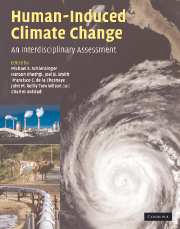Book contents
- Frontmatter
- Contents
- List of contributors
- Preface
- Part I Climate system science
- Part II Impacts and adaptation
- Part III Mitigation of greenhouse gases
- Part IV Policy design and decisionmaking under uncertainty
- 25 Climate policy design under uncertainty
- 26 Climate policy assessment using the Asia–Pacific Integrated Model
- 27 Price, quantity, and technology strategies for climate change policy
- 28 What is the economic value of information about climate thresholds?
- 29 Boiled frogs and path dependency in climate policy decisions
- 30 Article 2 and long-term climate stabilization: methods and models for decisionmaking under uncertainty
- 31 Whither integrated assessment? Reflections from the leading edge
- 32 Moving beyond concentrations: the challenge of limiting temperature change
- 33 International climate policy: approaches to policies and measures, and international coordination and cooperation
- Index
- Plate section
- References
31 - Whither integrated assessment? Reflections from the leading edge
from Part IV - Policy design and decisionmaking under uncertainty
Published online by Cambridge University Press: 06 December 2010
- Frontmatter
- Contents
- List of contributors
- Preface
- Part I Climate system science
- Part II Impacts and adaptation
- Part III Mitigation of greenhouse gases
- Part IV Policy design and decisionmaking under uncertainty
- 25 Climate policy design under uncertainty
- 26 Climate policy assessment using the Asia–Pacific Integrated Model
- 27 Price, quantity, and technology strategies for climate change policy
- 28 What is the economic value of information about climate thresholds?
- 29 Boiled frogs and path dependency in climate policy decisions
- 30 Article 2 and long-term climate stabilization: methods and models for decisionmaking under uncertainty
- 31 Whither integrated assessment? Reflections from the leading edge
- 32 Moving beyond concentrations: the challenge of limiting temperature change
- 33 International climate policy: approaches to policies and measures, and international coordination and cooperation
- Index
- Plate section
- References
Summary
Introduction
After 10 years of Climate Change Impacts and Integrated Assessment (CCI & IA) workshops under the aegis of the Energy Modeling Forum (EMF), it is appropriate to consider what progress has been made and what additional tasks confront us. The breadth and scope of the papers in this volume provide ample evidence of the progress. In this paper, we consider the additional tasks before us as a community interested in applying integrated assessment to a wide range of research and policy issues.
Integrated assessment (IA) has arisen and continues to grow in significance because it provides insights and understanding not available from research and analysis conducted from the perspective of individual disciplines. Increasingly, the questions arising from such integrated consideration of issues pose questions new to the respective disciplines, thus driving disciplinary research also.
The particular approach to integrated analysis of historic interest to EMF emphasizes solutions to the problems that have implications for both program direction and major resource allocation. Because of this, individuals who have, or represent, major political and economic interests in the outcome subject the results and components of the models to an unprecedented level of scrutiny. This scrutiny will affect not only model components but the structure of feedbacks and the tools for measuring impacts as well.
- Type
- Chapter
- Information
- Human-Induced Climate ChangeAn Interdisciplinary Assessment, pp. 377 - 386Publisher: Cambridge University PressPrint publication year: 2007



